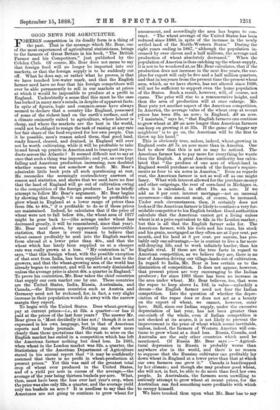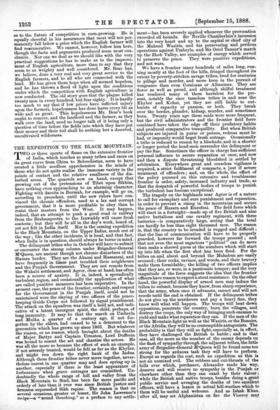GOOD NEWS FOR AGRICULTURE. F OREIGN competition in its deadly form
is a thing of the past. That is the message which Mr. Bear, one of the most experienced of agricultural statisticians, brings to the farmers of Great Britain in his book, " The British Farmer and his Competitors," just published by the Cobden Club. Of course, Mr. Bear does not mean to say that foreign food will no longer be imported into our markets, or that the foreign supply is to be suddenly cut off. What he does say, or rather what he proves, is that we have touched low-water mark, and that the English farmer need have no fear that his foreign competitors will ever be able permanently to sell in our markets at prices at which it would be impossible to produce at a profit in England. Undoubtedly a sense that this must be the case has lurked in many men's minds, in despite of apparent facts. In spite of figures, logic and common-sense have always seemed to declare that a country like England, possessed of some of the richest land on the earth's surface, and of a climate eminently suited to agriculture, where labour is cheap, and where the markets are the best in the world, could not be Obliged to resign the task of raising at any rate her fair share of the food required for her own people. Can it be possible, men's reason asked them, that good. land, ready fenced, cleared, and drained, in England. will ever not be worth cultivating, while it will be profitable to take in and break up prairie in America and to transport its pro- ducts across the Atlantic ? It seemed difficult not to say at once that such a thing was impossible; and yet, as corn kept falling and American production increasing, men doubted whether reason was not somehow at fault. Mr. Bear's admirable little book puts all such questioning at rest. He reconciles the seemingly contradictory answers of reason and statistics, and shows that we need have no fear that the land of England will go out of cultivation owing to the competition of the foreign producer. Let us briefly attempt to follow Mr. Bear's argument. Mr. Bear begins by showing that though " it can scarcely be profitable to grow wheat in England at a lower range of prices than from 36s. to 40s.," it is profitable to do so if those prices are maintained. Indeed, he calculates that if the price of wheat were not to fall below 40s., the wheat area of 1877 might be gone back to—(the acreage under wheat has decreased. greatly, it will be remembered, since that year). Mr. Bear next shows, by apparently incontrovertible statistics, that there is every reason to believe that wheat cannot profitably be sent into the English market from abroad at a lower price than 40s., and that the wheat which has lately been supplied us at a cheaper rate was really grown at a loss. " My contention is," he says, "that this foreign wheat, with the possible exception of that sent from India, has been supplied at a loss to the growers, and that the wheat-growing area of the world has already begun to contract, and will be seriously diminished unless the average price is about 40s. a quarter in England." To prove his contention, Mr. Bear takes the chief countries that supply our corn market one by one. These countries are the United States, India, Russia, Australasia, and Canada,—the European countries such as Austria and Germany need not be reckoned, for, in fact, a very slight increase in their population would do away with the narrow margin they export. To begin with the United States. Does wheat-growing pay at current prices-i.e., at 32s. a quarter—or has it paid. at the prices of the last four years ? The answer Mr. Bear gives is, Most decidedly it has not ;' though it is not expressed in his own language, but in that of American reports and trade journals. Nothing can show more clearly than these quotations that the rush to seize on the English market has ended in a competition which has left the American farmer nothing but dead loss. In 1885, when wheat in the London market was 32s. a quarter, the Statistician of the American Department of Agriculture stated in his annual report that " it may be confidently assumed that there is no profit in wheat-production at present prices." Yet this was said of the greatest total crop of wheat ever produced. in the United States, and of a yield per acre in excess of the average,—the average of the year being thirteen bushels per acre. What, then, must have been the loss over last year's crop, when the price was also only 32s. a quarter, and the average yield only ten bushels an acre ? It is needless to say that the Americans are not going to continue to grow wheat for amusement, and accordingly the area has begun to con- tract. " The wheat average of the United States has been reduced. since 1880, in spite of the increase in the newly settled land of the North-Western States." During the eight years ending in 1887, " although the population in- creased by over eleven and a half millions, the acreage and production of wheat absolutely decreased." When the population of America is thus catching up the wheat-supply, it is not to be wondered at, as Mr. Bear calculates, that if the production does not increase in the next five years, the sur- plus for export will only be five and a half million quarters, and that in tenyears from the present time the present wheat area, which, as we have shown, has not altered since 1880, will not be sufficient to support even the home population of the States. Such a result, however, will, of course, not ensue. The price will rise to a remunerative height, and then the area of production will at once enlarge. Mr. Bear puts yet another aspect of the American competition. In America, the average value of the wheat crop at recent prices has been 33s. an acre ; in England, £8 an acre. " I maintain," says he, " that English farmers can continue to grow wheat at £8 an acre longer than American farmers can keep on growing it at 33s. If the game of beggar my neighbour' is to go on, the American will be the first to. throw up his hand."
This is obviously true, unless, indeed, wheat-growing in England costs £6 7s. an acre more than in America. One fact to show that this is not so may be noticed. The American farmer has to pay more for everything he wants than the English. A great American authority has calcu- lated that " the produce of one acre of wheat-land in. England would purchase as much of the farmer's require- ments as four to six acres in America." Even as regards rent, the American farmer is not so well off as one might fancy. What with interest allowed for the purchase-money and other outgoings, the rent of corn-land in Michigan is, often it is calculated, in effect 19s. an acre. If we. add an 8 per cent. interest mortgage—not an unusual occurrence—this amount must, of course, be increased. Under such circumstances, then, it certainly does not look as if the American farmer is likely to continue a very for- midable competitor to his English brother. Good. authorities calculate that the American cannot get a living unless wheat is at a price equivalent to 42s. in the London market ; but this is all that the English farmer asks for. The American farmer, with his tools and his team, his stock and his grain, mortgaged as they often are at 3 per cent. per month, and his land at 8 per cent. per annum, has pro- bably only one advantage,—he is content to live a far more self-denying life, and to work infinitely harder, than his English rival. If these are the true facts in regard to American competition, as we believe they are, there is no fear of America driving our tillage-lands out of cultivation. In regard to India, Mr. Bear is less certain as to the diminution of competition. It does not appear, however, that present prices are very encouraging to. the Indian producer ; for since 1883 there has been no increase in the area under wheat. Mr. Bear believes, too, that were the rupee to keep above ls. 10d. in value—unluckily a dream—the English farmer need not fear the Indian competition. Into the question of whether the depre- ciation of the rupee does or does not act as a bounty on the export of wheat, we cannot, however, enter here. Still, since our Indian supply, under the excessive depreciation of last year, has not been greater than one-ninth of the whole, even if Indian competition is not checked at its source, it is not likely to prevent the improvement in the price of wheat which seems inevitable, unless, indeed, the farmers of Western America will eon- tinue to grow wheat at a dead loss. Russia, Canada, and Australia are the only other countries which need be mentioned. Of Russia Mr. Bear says " Agricul- tural depression in Russia is probably worse than anywhere else in the world, and there is no reason to suppose that. the Russian cultivator can profitably lay down wheat in England at a lower price than that at which our own farmers can grow it." Canada is handicapped by her climate ; and though she may produce good wheat, she will not, in fact, be able to do more than feed her own people. In Australasia., the farmers seem unwilling to seriously attempt to grow wheat at recent prices, for the Australian can find something more profitable with which to occupy himself.
We have touched thus upon what Mr. Bear has to say as to the future of competition in corn-growing. He is equally cheerful in his assurances that meat will not per- manently fall below a price which the English farmer will find remunerative. We cannot, however, follow him here, though the facts and arguments produced seem most con- clusive. Nor can we deal as we should like with the very practical suggestions he has to make as to the improve- ment of English agriculture, more than to say that they seem to us weighty and well considered. Mr. Bear has, we believe, done a very real and very great service to the English farmers, and to all who are connected with the land. He has given them hope when all seemed hopeless, and he has thrown a flood of light upon the conditions under which the competition with English agriculture is now conducted. The old story goes that the plague killed twenty men in every hundred, but fear eighty. It is hardly too much to say that if low prices have inflicted injury upon the farmers, hopelessness has done harm every bit as wide and as great. This hopelessness Mr. Bear's book ought to remove, and the landlord and the farmer, as they walk over the land, need no longer talk of it being only a question of time before the fields into which they have put their money and their toil shall be nothing but a deserted, uncultivated wilderness.



































 Previous page
Previous page